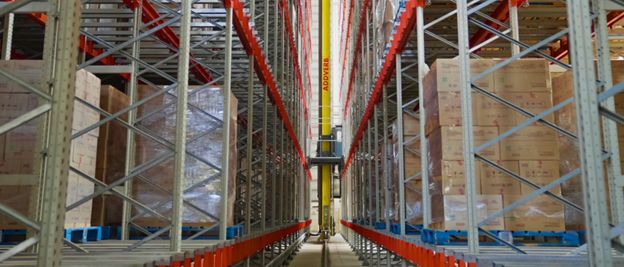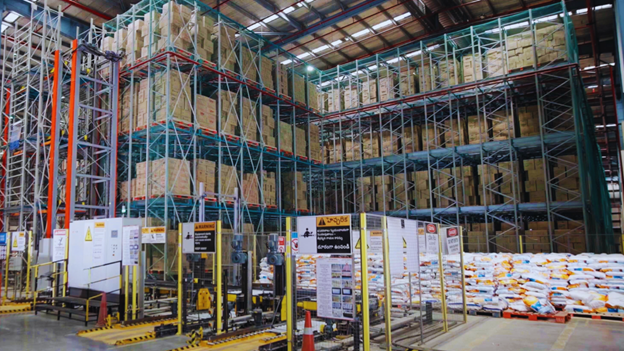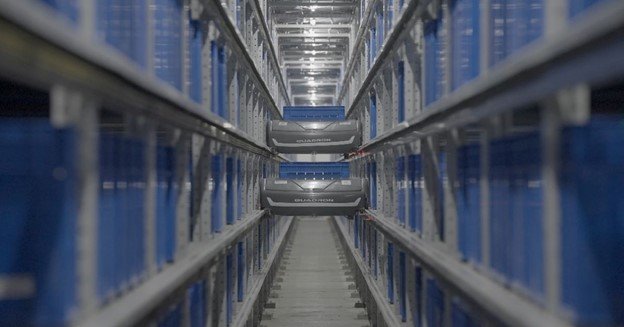Among these technologies, Automated Storage and Retrieval Systems (AS/RS) have emerged as a key solution for streamlining storage and retrieval processes, improving efficiency, and enabling greater operational control.
However, before implementing AS/RS, it’s vital to weigh its benefits against potential challenges to make an informed decision that aligns with your business goals.
What is AS/RS?
Automated Storage and Retrieval Systems (AS/RS) are advanced technologies designed to automate the storage, retrieval, and movement of goods within a warehouse. These systems leverage equipment such as shuttles, cranes, and robotics, powered by software that precisely manages inventory and order fulfillment.
By replacing manual processes with automation, the ASRS system enhances productivity, minimizes errors, and optimizes the utilization of available space. It is particularly advantageous for industries that require high-density storage, fast throughput, and precise inventory control.
Advantages of AS/RS for Warehouse Automation
1. Maximizing Warehouse Space

AS/RS allows businesses to utilize vertical storage space more effectively, enabling higher-density storage without increasing the warehouse footprint.
- This is particularly valuable for facilities facing space constraints or high real estate costs.
- The system enables the use of narrower aisles and taller storage racks, significantly increasing storage capacity.
2. Improved Accuracy in Operations
With automated systems handling inventory, the chances of errors in picking, storing, or retrieving goods are greatly reduced.
- This leads to increased order fulfillment accuracy, enhanced customer satisfaction, and fewer returns caused by picking mistakes.
- Accurate inventory tracking also ensures better stock control and planning.
3. Reduction in Labor Costs
By automating repetitive and time-consuming manual tasks, AS/RS reduces the dependency on manual labor.
- Businesses can lower operational costs by minimizing workforce requirements for inventory management and material handling.
- Additionally, the need for hiring and training staff is decreased, resulting in long-term cost savings.
4. Faster Throughput
AS/RS significantly accelerates storage and retrieval times, resulting in quicker order processing.
- With automated systems managing workflows, warehouses can easily handle high volumes, meet tight deadlines, and adapt to fluctuating demands more effectively.
- This is especially beneficial in industries such as e-commerce and retail, where speed is critical.
5. Enhanced Safety Standards
Automating the retrieval and storage of goods reduces the need for workers to perform potentially hazardous tasks, such as operating forklifts or handling heavy loads.
- This leads to fewer workplace injuries and creates a safer environment for employees.
Challenges of AS/RS for Warehouse Automation

1. High Initial Costs
Implementing AS/RS requires a significant upfront investment for purchasing equipment, installing infrastructure, and integrating software.
- The cost can be a challenge for small or medium-sized businesses with limited budgets.
- However, long-term savings in labor and operational efficiency can help offset the initial expense.
2. Complex Installation and Integration
Setting up AS/RS often involves redesigning existing warehouse layouts, integrating with warehouse management systems (WMS), and ensuring compatibility with existing operations.
- This process can be time-intensive and requires skilled professionals for successful implementation.
- Companies must plan for potential disruptions during the transition phase.
3. Maintenance Requirements
AS/RS systems require regular maintenance to ensure optimal performance and avoid downtime.
- The need for specialized technicians to handle repairs or system updates can add to operational costs.
- Failure to maintain the system properly could lead to delays or inefficiencies in workflows.
4. Limited Flexibility for Low-Volume Operations
While AS/RS performs exceptionally well in high-volume, repetitive environments, it may not be as effective for warehouses with low throughput or highly variable inventory requirements.
- Businesses with irregular product sizes or diverse storage needs may need to explore more adaptable solutions.
5. Dependence on Technology
As ASRS systems rely heavily on automation and software, any technical malfunction or security breach can disrupt operations.
- Businesses must invest in robust IT infrastructure and data protection measures to mitigate these risks.
How Can Addverb Help?

At Addverb, we specialize in designing and delivering advanced automation solutions tailored to meet the unique needs of businesses. Our range of AS/RS systems ensures:
- Optimal Space Utilization: Maximize storage capacity using high-density solutions.
- Enhanced Efficiency: Automate repetitive tasks and streamline workflows.
- Scalability: Easily adapt to changing business needs with flexible configurations.
Our portfolio of AS/RS solutions includes:
- Carton Shuttles for efficient order picking and storage
- Mother-Child Shuttle Systems for high-volume pallet handling
- Multi-Level Shuttles for large-scale operations
- Stacker Cranes for heavy-duty storage applications
With expertise in automated warehouse robots , Addverb ensures seamless integration and ongoing support to help businesses achieve their operational goals.
Success Stories of Automated Solutions: PepsiCo, Maersk, and ITC
Automation has revolutionized industries by enhancing efficiency, accuracy, and scalability. Companies like PepsiCo, Maersk, and ITC have successfully implemented advanced automated solutions, showcasing the transformative potential of technologies like ASRS (Automated Storage and Retrieval Systems) and mixed-case palletizing.
PepsiCo: PepsiCo adopted automated mixed-case palletizing to streamline its operations and improve efficiency. By leveraging advanced robotics and software, the system builds pallets optimized for transportation and store replenishment. This solution not only maximized floor space but also reduced handling time and labor dependency, enabling PepsiCo to meet high-demand schedules with precision and speed.
Maersk: Maersk integrated ASRS technology to optimize its warehousing and logistics operations. The system enabled high-density storage, faster retrieval times, and seamless inventory management, significantly improving throughput and reducing operational costs. This automation allowed Maersk to handle large volumes efficiently while maintaining accuracy and reliability.
ITC: ITC implemented ASRS and robotic solutions to enhance its supply chain operations. The automation improved storage utilization, reduced manual intervention, and ensured faster order fulfillment. By adopting these technologies, ITC achieved greater operational efficiency and scalability, meeting the demands of a rapidly growing market.
Conclusion
Automated Storage and Retrieval Systems (AS/RS) offer a powerful solution for improving warehouse efficiency, accuracy, and safety. However, businesses must carefully evaluate their specific needs, budget, and operational priorities before implementing these systems.
While AS/RS brings numerous benefits such as increased storage capacity, faster throughput, and reduced labor costs, it also requires a significant initial investment and ongoing maintenance. Partnering with an experienced provider like Addverb can help mitigate these challenges and ensure a smooth transition to automation.
If you’re ready to take your warehouse operations to the next level, contact Addverb to explore how our tailored solutions can help you achieve your goals.
